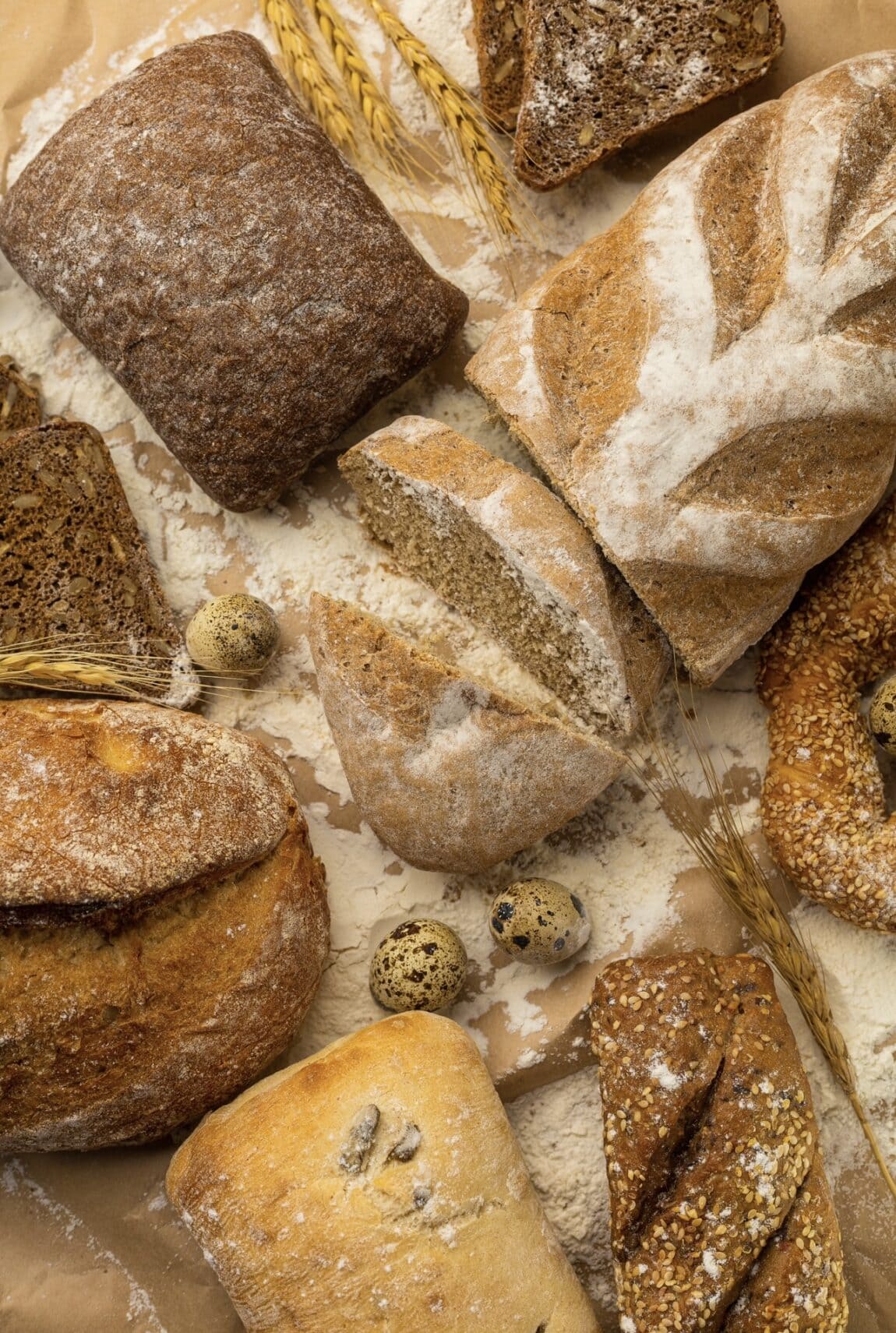
Gluten And Hashimoto’s – What Are The Effects Of Gluten?
Hashimoto’s disease, or Hashimoto’s thyroiditis, is an autoimmune disease that affects your thyroid. Your thyroid is a gland at the base of your neck that is responsible for producing vital hormones (triiodothyronine and thyroxine).
These hormones play an important role in many of the body’s systems and functions. They’re involved in everything from your metabolism and heart rate to your brain function.
In people with Hashimoto’s, like me, the immune system attacks the thyroid tissue, which then affects hormone production, leading to hypothyroidism. Hypothyroidism is when the thyroid isn’t producing enough thyroid hormone.
There are many uncomfortable symptoms of Hashimoto’s, the worst of which are experienced during a flare up. Certain factors, like gluten, can cause flare ups, which is why I avoid them at all costs and have chosen to remove gluten from my diet completely and non-negotiably.
For me personally, gluten is a HUGE trigger. I’m talking about intense swelling, hives, and weeks (possibly months) of getting my immune system back to a normal state. So to me, it is simply not worth it – ever.
If you’re curious about the connection between gluten and Hashimoto’s and whether you should continue to eat gluten, I’m glad you’re here, and I’m happy to share what I’ve learned along the way. Let’s get into it.
Gluten And Hashimoto’s – What Are The Effects Of Gluten?
Gluten Causes Inflammation In The Thyroid Gland
Many studies have found gluten to be a contributing factor to many autoimmune conditions, including Hashimoto’s. Gluten creates inflammation in the thyroid gland through a process known as “molecular mimicry.” Essentially, your body’s immune system overreacts by attacking the gluten as well as your own body tissue.
This reaction is supported by the number of people with Hashimoto’s who have reported that giving up gluten helped to reduce inflammation in their bodies.
Gluten Contributes To Symptoms Of A Hashimoto’s Flare Up
People with Hashimoto’s thyroiditis also have greater levels of antibodies like thyroid peroxidase (TPO) and thyroglobulin (TG). These antibodies contribute to those nagging symptoms you sometimes experience. By lowering those antibody levels, you can potentially reduce the severity of your Hashimoto’s symptoms.
One possible way to reduce antibodies and therefore ease your symptoms is to follow a gluten-free diet. The same study cited above found that Hashimoto’s patients can benefit from eliminating gluten from their diet due to the interaction between gluten and thyroid antigens.

Is A Gluten-Free Diet Good For Hashimoto’s?
Research continues to find a correlation between gluten intake and Hashimoto’s. Here are some recent studies that, in my opinion, more than prove the negative effects gluten could be having on your autoimmune body.
Several studies have found a strong connection between autoimmune thyroid disorders, like Hashimoto’s and Graves, and gluten intolerance. The connection was so strong that researchers suggest people with autoimmune thyroid conditions be screened for gluten sensitivity.
In a study that looked at non-celiac wheat sensitivity (NCWS) in people with autoimmune diseases, researchers found that 29 percent of people with NCWS and 29 percent of people with celiac disease developed an autoimmune condition, particularly Hashimoto’s thyroiditis.
Recently, a different study examined the effects of a gluten-free diet on autoimmunity among women with Hashimoto’s. The results of the study suggest that a gluten-free diet can “bring clinical benefits to women with autoimmune thyroid disease.”
Another study found that up to 71 percent of patients’ low thyroid symptoms were completely resolved after following a strict gluten-free diet for one year.
What To Eat On A Gluten-Free Diet
Even if you aren’t one of the millions of people with celiac disease or a wheat allergy, following a gluten-free diet can improve symptoms of Hashimoto’s. Here are the foods I keep in healthy supply in my home.
Fruits
Fruits are great for your overall health. Many of them are also naturally gluten-free. Feel free to enjoy berries, cherries, grapes, and pineapple in moderation.
Vegetables
Vegetables are also an important part of a healthy diet. Fortunately, most of them can be included in a gluten-free diet. The following veggies are naturally gluten-free.
- Broccoli
- Cauliflower
- Mushrooms
- Bell peppers
- Tomatoes
- Dark leafy greens (spinach, kale, etc.)

Healthy Fats
Don’t forget to include healthy fats in your daily diet as well. They’re not only very beneficial for your overall health, but they can also help you avoid weight gain, another unfortunate side effect of Hashimoto’s.
Some of the best healthy fats to incorporate into a gluten-free diet are avocado, extra-virgin olive oil, nuts, and fatty fish like salmon and mackerel.
Protein
Protein is an essential part of any diet. The right kinds of protein can also help prevent weight gain and improve energy levels. As a vegan, I only eat non-animal forms of protein, but everyone needs to do what works for them. The best forms of protein to include in a gluten-free diet are:
- Chicken
- Beef
- Turkey
- Tofu
Foods High In Selenium
Selenium is one of the best nutrients for someone with an autoimmune condition who is following a gluten-free diet. To ensure you’re getting enough selenium, incorporate Brazil nuts, pork, brown rice, and eggs into your diet whenever possible.
Foods High In Iron
Iron is another essential nutrient that plays a role in many of the body’s basic functions. Spinach and red meat are two of the best sources of iron.
Gluten-Free Grains
Following a gluten-free diet doesn’t mean you have to give up grains entirely. Instead, opt for gluten-free grains like brown rice, certified gluten-free oats, millet, buckwheat, and amaranth.
What Not To Eat On A Gluten-Free Diet
It can be hard to know exactly which foods to avoid when you’re trying not to consume gluten. I know from experience that it takes not only research and time but plenty of patience as well. A true gluten-free and anti-inflammatory diet should not include the following foods.
Grains Containing Gluten
Grains are among the worst foods for Hashimoto’s. You should avoid any grains that contain gluten, including wheat, barley, bulgur, rye, and seitan.
Pure Wheat And All Forms Of Wheat
As mentioned above, wheat is a grain that is known to cause many uncomfortable symptoms of Hashimoto’s, including irritable bowel syndrome. But a lot of people don’t know that there are actually different forms of wheat. When reading food labels at the grocery, put the item back on the shelf if you see any of these ingredients listed:
- Wheat starch
- Wheat bran
- Wheat germ
- Couscous
- Cracked wheat
- Farro
- Semolina
- Spelt
Beer And Malt Beverages
Sorry beer drinkers, but most beer and malt beverages contain gluten. There are some varieties of gluten-free beer available, but unless it’s clearly labeled gluten-free, you’ll want to avoid it.

Miscellaneous Items That Usually Contain Gluten
As always, I highly recommend reading ingredient labels before buying or consuming a food product. It’s the only way you’ll know exactly what you’re consuming. Here are several more miscellaneous items that usually contain gluten.
- Barley malt
- Some chicken, beef, and vegetable broths
- Malt vinegar
- Some salad dressings
- Veggie burgers
- Frozen meals
- Condiments
- Soba noodles
For some people with Hashimoto’s, following a gluten-free diet can ease symptoms and help prevent flare-ups.
Being gluten-free is one of my non-negotiable health habits. It has made a significant difference in my quality of life. I encourage you to consider going gluten-free if you’re a chronic illness warrior like me.
To read more about living with chronic illness and managing symptoms of an autoimmune condition, head over to the blog.

